BULAW5916: Taxation Law Assignment - Harding v Commissioner Cases
VerifiedAdded on 2022/11/29
|9
|2332
|414
Essay
AI Summary
This essay analyzes the implications of the Harding v Commissioner of Taxation [2018] FCA 837 and Harding v Federal Commissioner of Taxation [2019] FCAFC 29 cases, focusing on the tax implications for Australian expatriates. The essay discusses the residency-based taxation system in Australia and the challenges faced by expatriates. It explores the concept of 'permanent place of abode' and its importance in determining tax residency. The analysis covers the application of the ordinary concept test, the implications for expatriates living abroad, and the factors considered by the court in determining residency. The essay highlights the significance of the court's decisions for expatriates and provides insights into the complexities of Australian taxation law. The essay emphasizes the importance of considering the overall facts and circumstances when determining tax residency and the need for expatriates to be aware of their tax obligations. The essay also references the relevant case law and legislation to support its arguments.
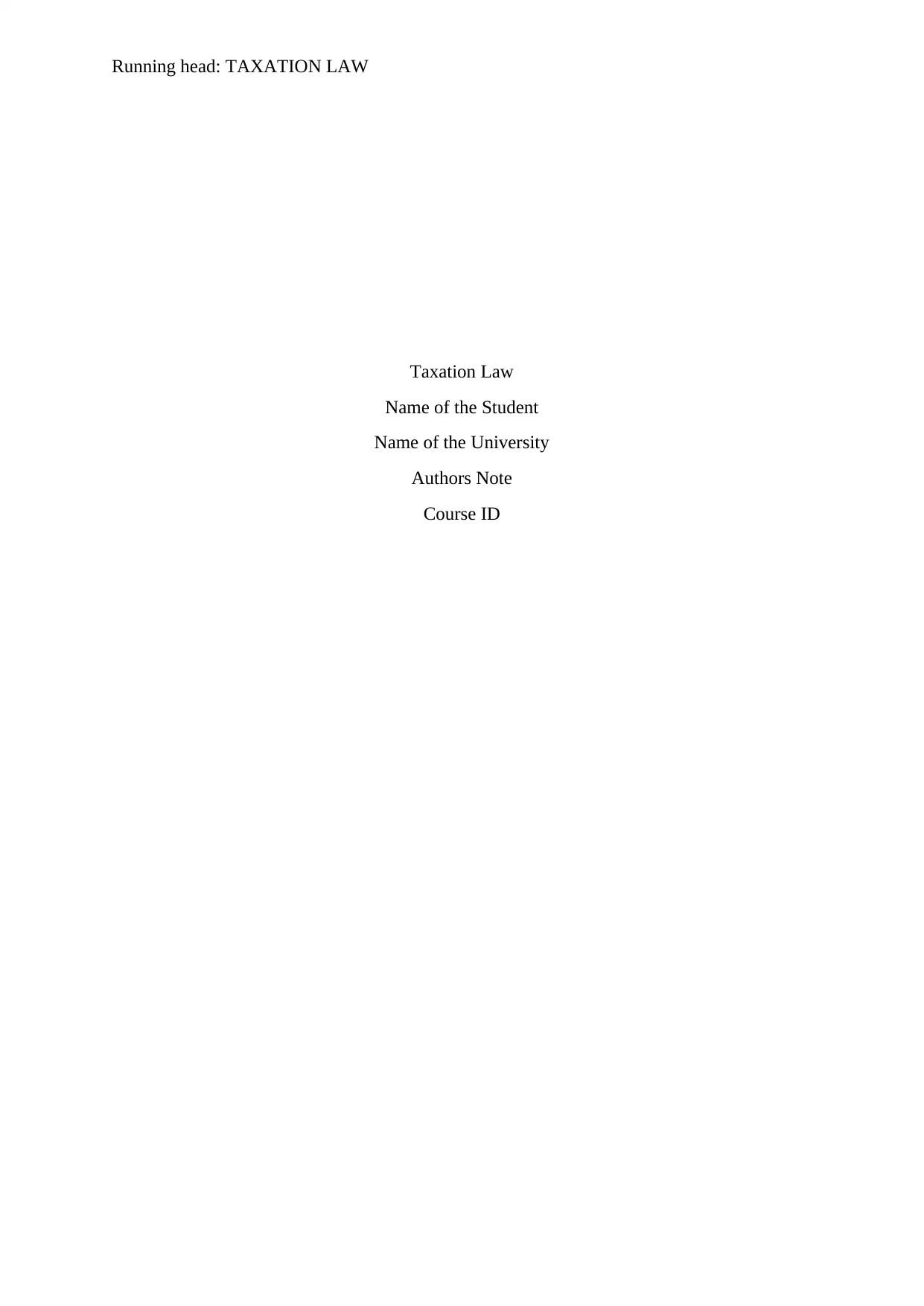
Running head: TAXATION LAW
Taxation Law
Name of the Student
Name of the University
Authors Note
Course ID
Taxation Law
Name of the Student
Name of the University
Authors Note
Course ID
Paraphrase This Document
Need a fresh take? Get an instant paraphrase of this document with our AI Paraphraser
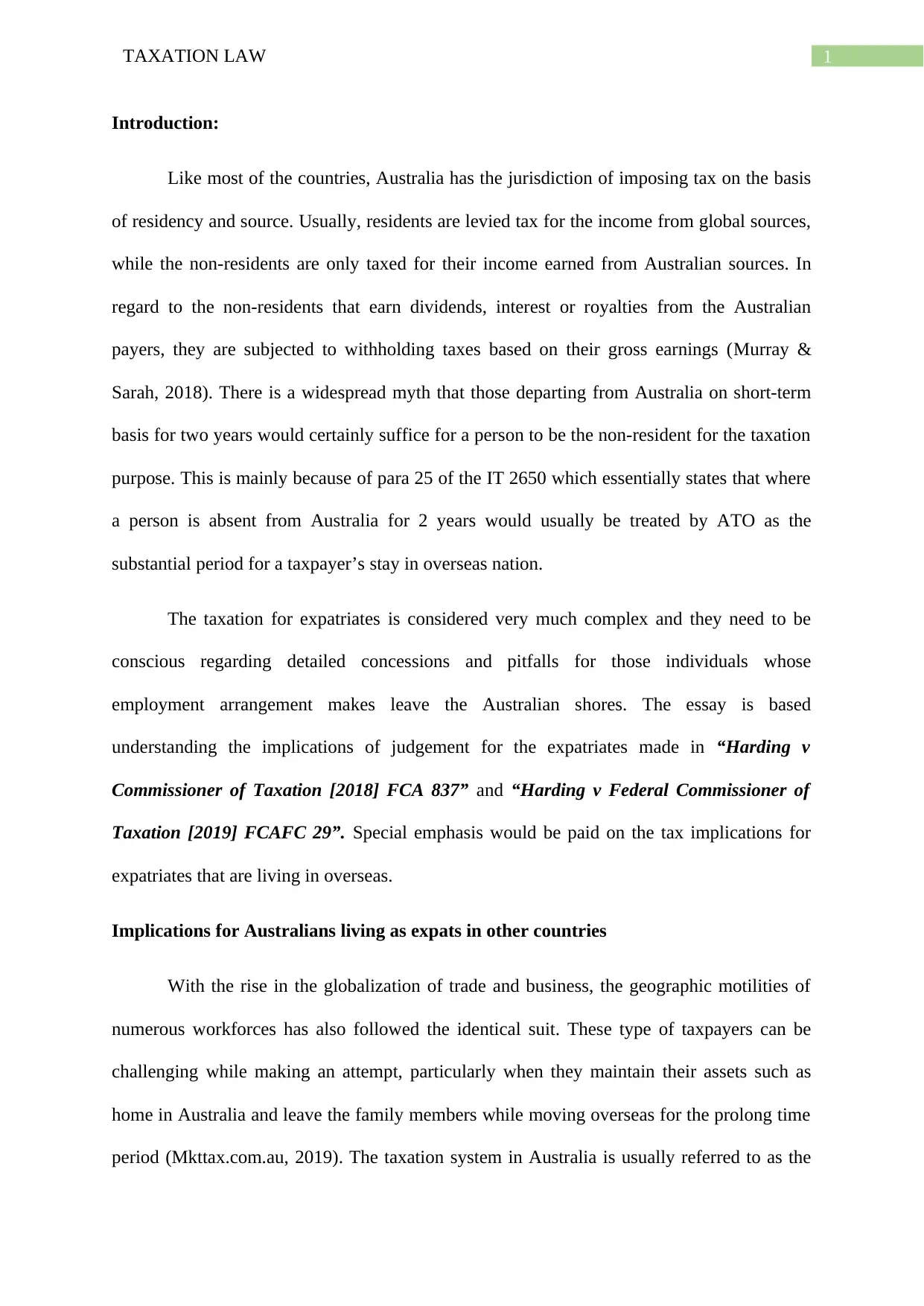
1TAXATION LAW
Introduction:
Like most of the countries, Australia has the jurisdiction of imposing tax on the basis
of residency and source. Usually, residents are levied tax for the income from global sources,
while the non-residents are only taxed for their income earned from Australian sources. In
regard to the non-residents that earn dividends, interest or royalties from the Australian
payers, they are subjected to withholding taxes based on their gross earnings (Murray &
Sarah, 2018). There is a widespread myth that those departing from Australia on short-term
basis for two years would certainly suffice for a person to be the non-resident for the taxation
purpose. This is mainly because of para 25 of the IT 2650 which essentially states that where
a person is absent from Australia for 2 years would usually be treated by ATO as the
substantial period for a taxpayer’s stay in overseas nation.
The taxation for expatriates is considered very much complex and they need to be
conscious regarding detailed concessions and pitfalls for those individuals whose
employment arrangement makes leave the Australian shores. The essay is based
understanding the implications of judgement for the expatriates made in “Harding v
Commissioner of Taxation [2018] FCA 837” and “Harding v Federal Commissioner of
Taxation [2019] FCAFC 29”. Special emphasis would be paid on the tax implications for
expatriates that are living in overseas.
Implications for Australians living as expats in other countries
With the rise in the globalization of trade and business, the geographic motilities of
numerous workforces has also followed the identical suit. These type of taxpayers can be
challenging while making an attempt, particularly when they maintain their assets such as
home in Australia and leave the family members while moving overseas for the prolong time
period (Mkttax.com.au, 2019). The taxation system in Australia is usually referred to as the
Introduction:
Like most of the countries, Australia has the jurisdiction of imposing tax on the basis
of residency and source. Usually, residents are levied tax for the income from global sources,
while the non-residents are only taxed for their income earned from Australian sources. In
regard to the non-residents that earn dividends, interest or royalties from the Australian
payers, they are subjected to withholding taxes based on their gross earnings (Murray &
Sarah, 2018). There is a widespread myth that those departing from Australia on short-term
basis for two years would certainly suffice for a person to be the non-resident for the taxation
purpose. This is mainly because of para 25 of the IT 2650 which essentially states that where
a person is absent from Australia for 2 years would usually be treated by ATO as the
substantial period for a taxpayer’s stay in overseas nation.
The taxation for expatriates is considered very much complex and they need to be
conscious regarding detailed concessions and pitfalls for those individuals whose
employment arrangement makes leave the Australian shores. The essay is based
understanding the implications of judgement for the expatriates made in “Harding v
Commissioner of Taxation [2018] FCA 837” and “Harding v Federal Commissioner of
Taxation [2019] FCAFC 29”. Special emphasis would be paid on the tax implications for
expatriates that are living in overseas.
Implications for Australians living as expats in other countries
With the rise in the globalization of trade and business, the geographic motilities of
numerous workforces has also followed the identical suit. These type of taxpayers can be
challenging while making an attempt, particularly when they maintain their assets such as
home in Australia and leave the family members while moving overseas for the prolong time
period (Mkttax.com.au, 2019). The taxation system in Australia is usually referred to as the
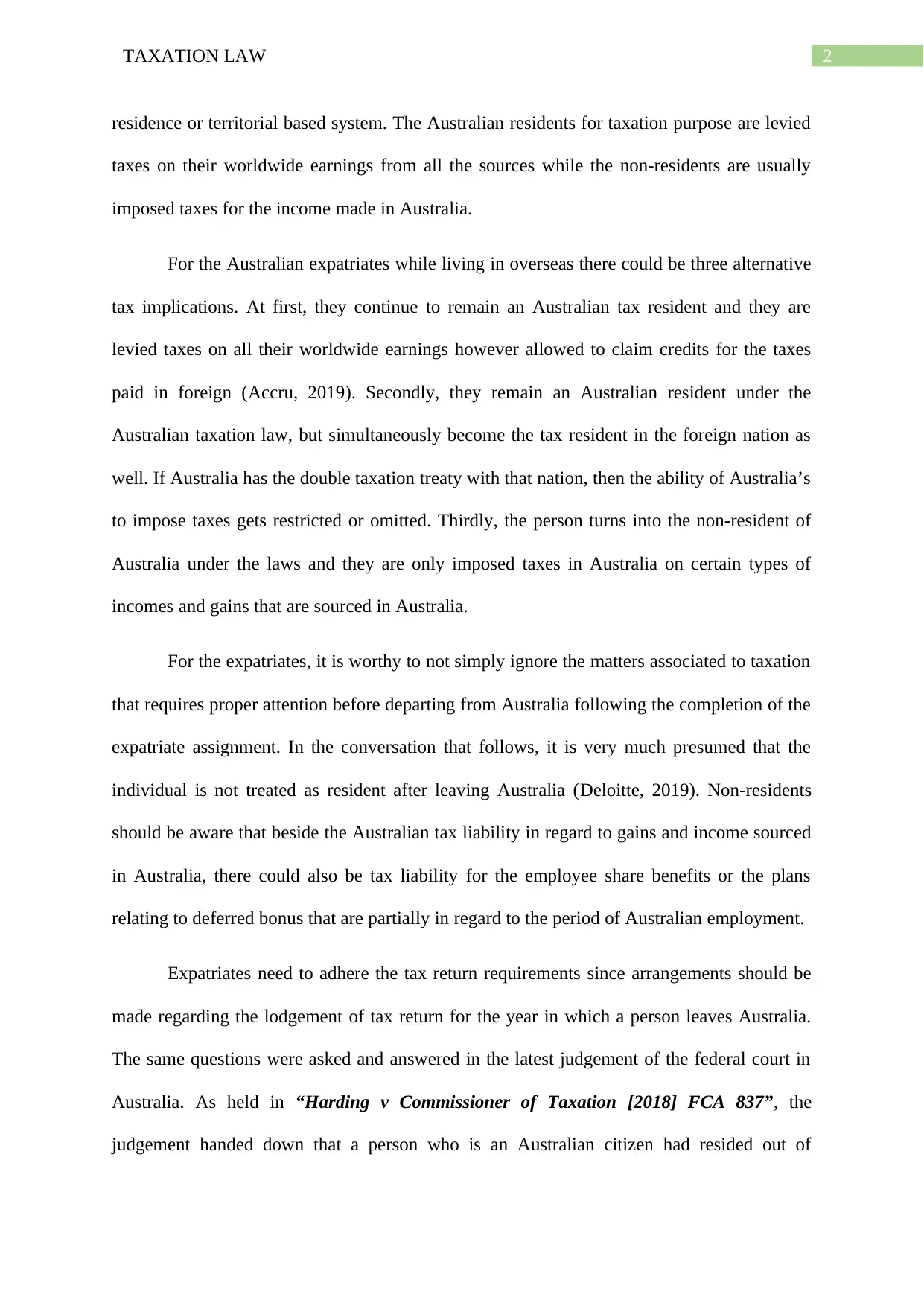
2TAXATION LAW
residence or territorial based system. The Australian residents for taxation purpose are levied
taxes on their worldwide earnings from all the sources while the non-residents are usually
imposed taxes for the income made in Australia.
For the Australian expatriates while living in overseas there could be three alternative
tax implications. At first, they continue to remain an Australian tax resident and they are
levied taxes on all their worldwide earnings however allowed to claim credits for the taxes
paid in foreign (Accru, 2019). Secondly, they remain an Australian resident under the
Australian taxation law, but simultaneously become the tax resident in the foreign nation as
well. If Australia has the double taxation treaty with that nation, then the ability of Australia’s
to impose taxes gets restricted or omitted. Thirdly, the person turns into the non-resident of
Australia under the laws and they are only imposed taxes in Australia on certain types of
incomes and gains that are sourced in Australia.
For the expatriates, it is worthy to not simply ignore the matters associated to taxation
that requires proper attention before departing from Australia following the completion of the
expatriate assignment. In the conversation that follows, it is very much presumed that the
individual is not treated as resident after leaving Australia (Deloitte, 2019). Non-residents
should be aware that beside the Australian tax liability in regard to gains and income sourced
in Australia, there could also be tax liability for the employee share benefits or the plans
relating to deferred bonus that are partially in regard to the period of Australian employment.
Expatriates need to adhere the tax return requirements since arrangements should be
made regarding the lodgement of tax return for the year in which a person leaves Australia.
The same questions were asked and answered in the latest judgement of the federal court in
Australia. As held in “Harding v Commissioner of Taxation [2018] FCA 837”, the
judgement handed down that a person who is an Australian citizen had resided out of
residence or territorial based system. The Australian residents for taxation purpose are levied
taxes on their worldwide earnings from all the sources while the non-residents are usually
imposed taxes for the income made in Australia.
For the Australian expatriates while living in overseas there could be three alternative
tax implications. At first, they continue to remain an Australian tax resident and they are
levied taxes on all their worldwide earnings however allowed to claim credits for the taxes
paid in foreign (Accru, 2019). Secondly, they remain an Australian resident under the
Australian taxation law, but simultaneously become the tax resident in the foreign nation as
well. If Australia has the double taxation treaty with that nation, then the ability of Australia’s
to impose taxes gets restricted or omitted. Thirdly, the person turns into the non-resident of
Australia under the laws and they are only imposed taxes in Australia on certain types of
incomes and gains that are sourced in Australia.
For the expatriates, it is worthy to not simply ignore the matters associated to taxation
that requires proper attention before departing from Australia following the completion of the
expatriate assignment. In the conversation that follows, it is very much presumed that the
individual is not treated as resident after leaving Australia (Deloitte, 2019). Non-residents
should be aware that beside the Australian tax liability in regard to gains and income sourced
in Australia, there could also be tax liability for the employee share benefits or the plans
relating to deferred bonus that are partially in regard to the period of Australian employment.
Expatriates need to adhere the tax return requirements since arrangements should be
made regarding the lodgement of tax return for the year in which a person leaves Australia.
The same questions were asked and answered in the latest judgement of the federal court in
Australia. As held in “Harding v Commissioner of Taxation [2018] FCA 837”, the
judgement handed down that a person who is an Australian citizen had resided out of
⊘ This is a preview!⊘
Do you want full access?
Subscribe today to unlock all pages.

Trusted by 1+ million students worldwide
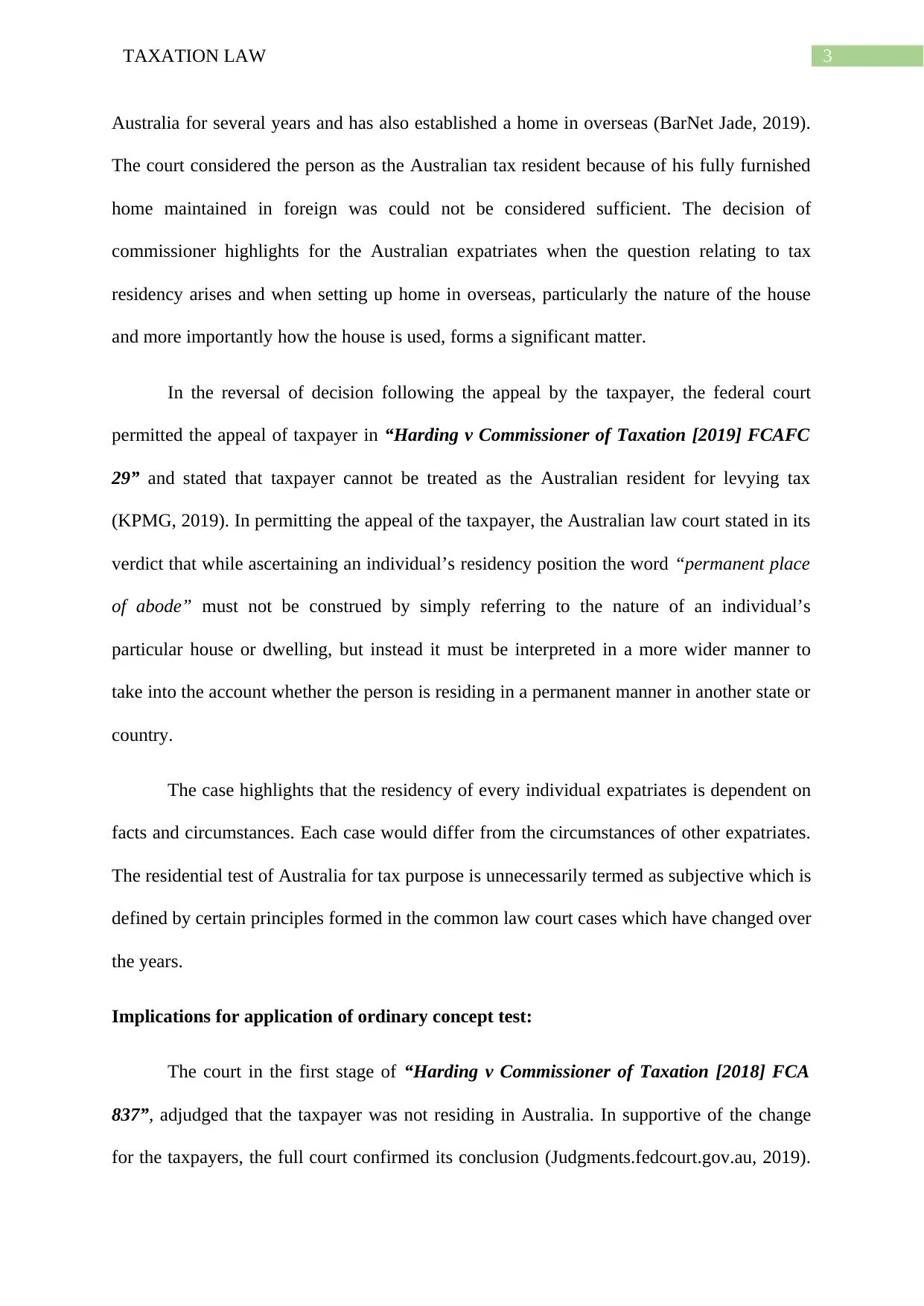
3TAXATION LAW
Australia for several years and has also established a home in overseas (BarNet Jade, 2019).
The court considered the person as the Australian tax resident because of his fully furnished
home maintained in foreign was could not be considered sufficient. The decision of
commissioner highlights for the Australian expatriates when the question relating to tax
residency arises and when setting up home in overseas, particularly the nature of the house
and more importantly how the house is used, forms a significant matter.
In the reversal of decision following the appeal by the taxpayer, the federal court
permitted the appeal of taxpayer in “Harding v Commissioner of Taxation [2019] FCAFC
29” and stated that taxpayer cannot be treated as the Australian resident for levying tax
(KPMG, 2019). In permitting the appeal of the taxpayer, the Australian law court stated in its
verdict that while ascertaining an individual’s residency position the word “permanent place
of abode” must not be construed by simply referring to the nature of an individual’s
particular house or dwelling, but instead it must be interpreted in a more wider manner to
take into the account whether the person is residing in a permanent manner in another state or
country.
The case highlights that the residency of every individual expatriates is dependent on
facts and circumstances. Each case would differ from the circumstances of other expatriates.
The residential test of Australia for tax purpose is unnecessarily termed as subjective which is
defined by certain principles formed in the common law court cases which have changed over
the years.
Implications for application of ordinary concept test:
The court in the first stage of “Harding v Commissioner of Taxation [2018] FCA
837”, adjudged that the taxpayer was not residing in Australia. In supportive of the change
for the taxpayers, the full court confirmed its conclusion (Judgments.fedcourt.gov.au, 2019).
Australia for several years and has also established a home in overseas (BarNet Jade, 2019).
The court considered the person as the Australian tax resident because of his fully furnished
home maintained in foreign was could not be considered sufficient. The decision of
commissioner highlights for the Australian expatriates when the question relating to tax
residency arises and when setting up home in overseas, particularly the nature of the house
and more importantly how the house is used, forms a significant matter.
In the reversal of decision following the appeal by the taxpayer, the federal court
permitted the appeal of taxpayer in “Harding v Commissioner of Taxation [2019] FCAFC
29” and stated that taxpayer cannot be treated as the Australian resident for levying tax
(KPMG, 2019). In permitting the appeal of the taxpayer, the Australian law court stated in its
verdict that while ascertaining an individual’s residency position the word “permanent place
of abode” must not be construed by simply referring to the nature of an individual’s
particular house or dwelling, but instead it must be interpreted in a more wider manner to
take into the account whether the person is residing in a permanent manner in another state or
country.
The case highlights that the residency of every individual expatriates is dependent on
facts and circumstances. Each case would differ from the circumstances of other expatriates.
The residential test of Australia for tax purpose is unnecessarily termed as subjective which is
defined by certain principles formed in the common law court cases which have changed over
the years.
Implications for application of ordinary concept test:
The court in the first stage of “Harding v Commissioner of Taxation [2018] FCA
837”, adjudged that the taxpayer was not residing in Australia. In supportive of the change
for the taxpayers, the full court confirmed its conclusion (Judgments.fedcourt.gov.au, 2019).
Paraphrase This Document
Need a fresh take? Get an instant paraphrase of this document with our AI Paraphraser
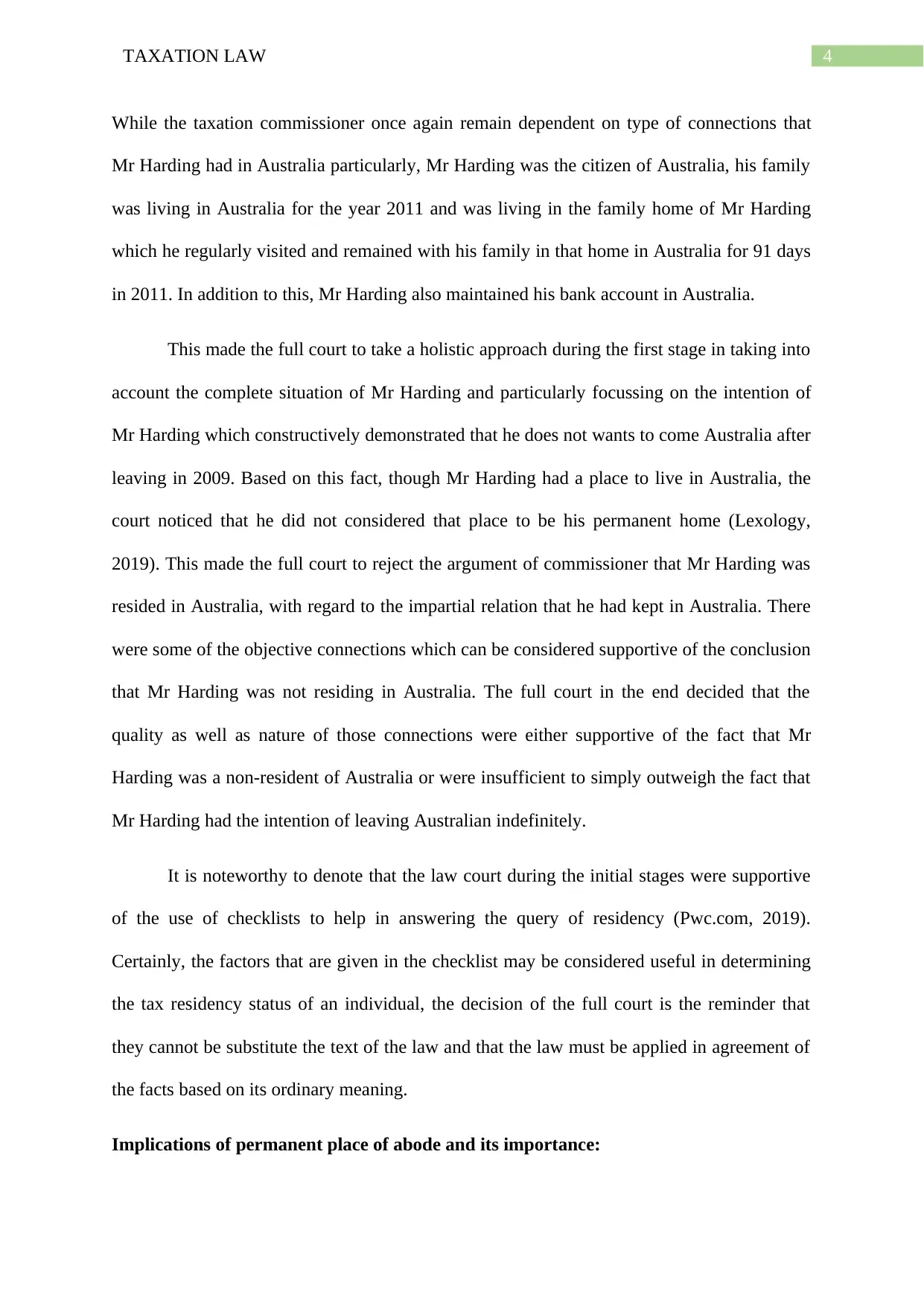
4TAXATION LAW
While the taxation commissioner once again remain dependent on type of connections that
Mr Harding had in Australia particularly, Mr Harding was the citizen of Australia, his family
was living in Australia for the year 2011 and was living in the family home of Mr Harding
which he regularly visited and remained with his family in that home in Australia for 91 days
in 2011. In addition to this, Mr Harding also maintained his bank account in Australia.
This made the full court to take a holistic approach during the first stage in taking into
account the complete situation of Mr Harding and particularly focussing on the intention of
Mr Harding which constructively demonstrated that he does not wants to come Australia after
leaving in 2009. Based on this fact, though Mr Harding had a place to live in Australia, the
court noticed that he did not considered that place to be his permanent home (Lexology,
2019). This made the full court to reject the argument of commissioner that Mr Harding was
resided in Australia, with regard to the impartial relation that he had kept in Australia. There
were some of the objective connections which can be considered supportive of the conclusion
that Mr Harding was not residing in Australia. The full court in the end decided that the
quality as well as nature of those connections were either supportive of the fact that Mr
Harding was a non-resident of Australia or were insufficient to simply outweigh the fact that
Mr Harding had the intention of leaving Australian indefinitely.
It is noteworthy to denote that the law court during the initial stages were supportive
of the use of checklists to help in answering the query of residency (Pwc.com, 2019).
Certainly, the factors that are given in the checklist may be considered useful in determining
the tax residency status of an individual, the decision of the full court is the reminder that
they cannot be substitute the text of the law and that the law must be applied in agreement of
the facts based on its ordinary meaning.
Implications of permanent place of abode and its importance:
While the taxation commissioner once again remain dependent on type of connections that
Mr Harding had in Australia particularly, Mr Harding was the citizen of Australia, his family
was living in Australia for the year 2011 and was living in the family home of Mr Harding
which he regularly visited and remained with his family in that home in Australia for 91 days
in 2011. In addition to this, Mr Harding also maintained his bank account in Australia.
This made the full court to take a holistic approach during the first stage in taking into
account the complete situation of Mr Harding and particularly focussing on the intention of
Mr Harding which constructively demonstrated that he does not wants to come Australia after
leaving in 2009. Based on this fact, though Mr Harding had a place to live in Australia, the
court noticed that he did not considered that place to be his permanent home (Lexology,
2019). This made the full court to reject the argument of commissioner that Mr Harding was
resided in Australia, with regard to the impartial relation that he had kept in Australia. There
were some of the objective connections which can be considered supportive of the conclusion
that Mr Harding was not residing in Australia. The full court in the end decided that the
quality as well as nature of those connections were either supportive of the fact that Mr
Harding was a non-resident of Australia or were insufficient to simply outweigh the fact that
Mr Harding had the intention of leaving Australian indefinitely.
It is noteworthy to denote that the law court during the initial stages were supportive
of the use of checklists to help in answering the query of residency (Pwc.com, 2019).
Certainly, the factors that are given in the checklist may be considered useful in determining
the tax residency status of an individual, the decision of the full court is the reminder that
they cannot be substitute the text of the law and that the law must be applied in agreement of
the facts based on its ordinary meaning.
Implications of permanent place of abode and its importance:
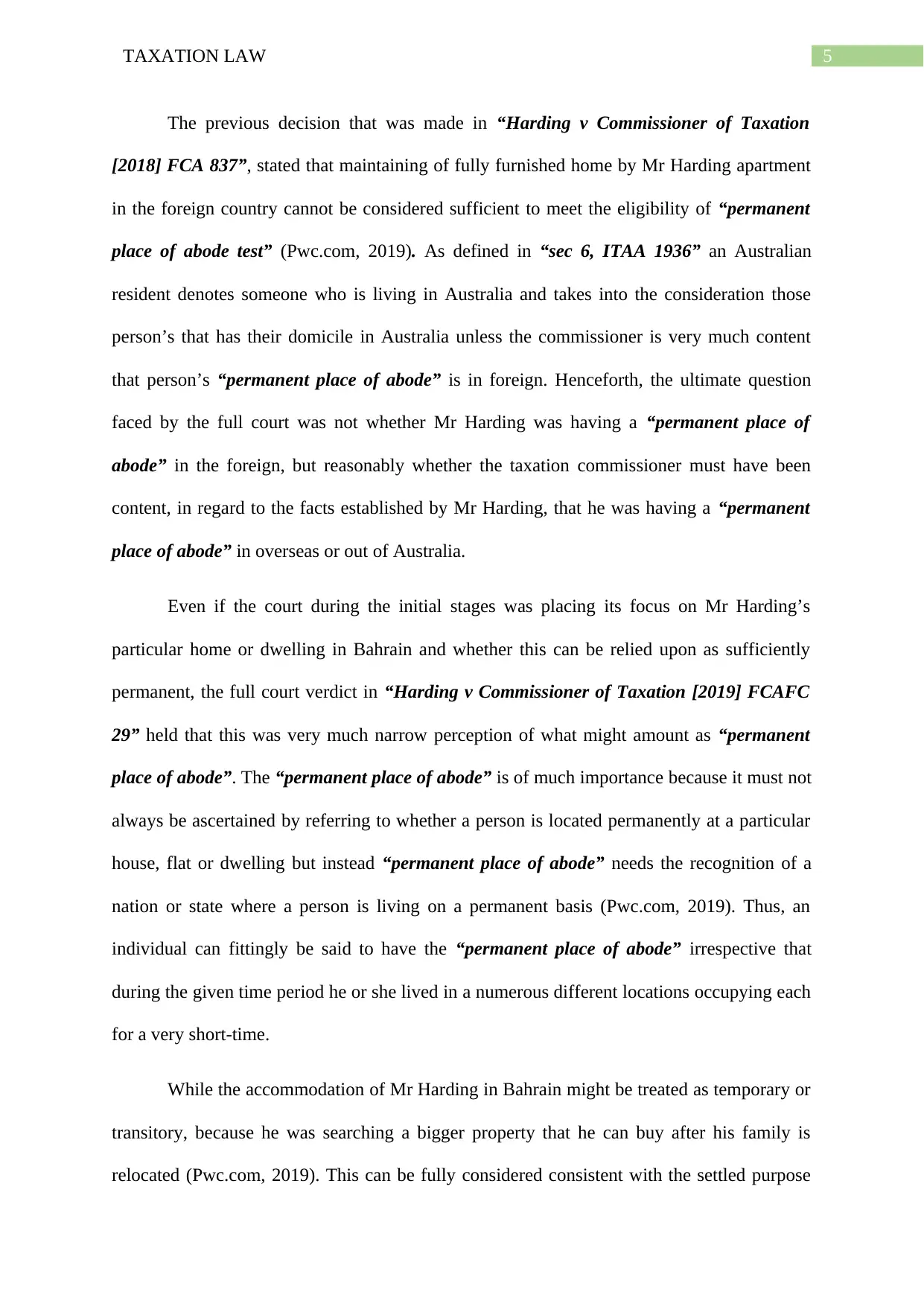
5TAXATION LAW
The previous decision that was made in “Harding v Commissioner of Taxation
[2018] FCA 837”, stated that maintaining of fully furnished home by Mr Harding apartment
in the foreign country cannot be considered sufficient to meet the eligibility of “permanent
place of abode test” (Pwc.com, 2019). As defined in “sec 6, ITAA 1936” an Australian
resident denotes someone who is living in Australia and takes into the consideration those
person’s that has their domicile in Australia unless the commissioner is very much content
that person’s “permanent place of abode” is in foreign. Henceforth, the ultimate question
faced by the full court was not whether Mr Harding was having a “permanent place of
abode” in the foreign, but reasonably whether the taxation commissioner must have been
content, in regard to the facts established by Mr Harding, that he was having a “permanent
place of abode” in overseas or out of Australia.
Even if the court during the initial stages was placing its focus on Mr Harding’s
particular home or dwelling in Bahrain and whether this can be relied upon as sufficiently
permanent, the full court verdict in “Harding v Commissioner of Taxation [2019] FCAFC
29” held that this was very much narrow perception of what might amount as “permanent
place of abode”. The “permanent place of abode” is of much importance because it must not
always be ascertained by referring to whether a person is located permanently at a particular
house, flat or dwelling but instead “permanent place of abode” needs the recognition of a
nation or state where a person is living on a permanent basis (Pwc.com, 2019). Thus, an
individual can fittingly be said to have the “permanent place of abode” irrespective that
during the given time period he or she lived in a numerous different locations occupying each
for a very short-time.
While the accommodation of Mr Harding in Bahrain might be treated as temporary or
transitory, because he was searching a bigger property that he can buy after his family is
relocated (Pwc.com, 2019). This can be fully considered consistent with the settled purpose
The previous decision that was made in “Harding v Commissioner of Taxation
[2018] FCA 837”, stated that maintaining of fully furnished home by Mr Harding apartment
in the foreign country cannot be considered sufficient to meet the eligibility of “permanent
place of abode test” (Pwc.com, 2019). As defined in “sec 6, ITAA 1936” an Australian
resident denotes someone who is living in Australia and takes into the consideration those
person’s that has their domicile in Australia unless the commissioner is very much content
that person’s “permanent place of abode” is in foreign. Henceforth, the ultimate question
faced by the full court was not whether Mr Harding was having a “permanent place of
abode” in the foreign, but reasonably whether the taxation commissioner must have been
content, in regard to the facts established by Mr Harding, that he was having a “permanent
place of abode” in overseas or out of Australia.
Even if the court during the initial stages was placing its focus on Mr Harding’s
particular home or dwelling in Bahrain and whether this can be relied upon as sufficiently
permanent, the full court verdict in “Harding v Commissioner of Taxation [2019] FCAFC
29” held that this was very much narrow perception of what might amount as “permanent
place of abode”. The “permanent place of abode” is of much importance because it must not
always be ascertained by referring to whether a person is located permanently at a particular
house, flat or dwelling but instead “permanent place of abode” needs the recognition of a
nation or state where a person is living on a permanent basis (Pwc.com, 2019). Thus, an
individual can fittingly be said to have the “permanent place of abode” irrespective that
during the given time period he or she lived in a numerous different locations occupying each
for a very short-time.
While the accommodation of Mr Harding in Bahrain might be treated as temporary or
transitory, because he was searching a bigger property that he can buy after his family is
relocated (Pwc.com, 2019). This can be fully considered consistent with the settled purpose
⊘ This is a preview!⊘
Do you want full access?
Subscribe today to unlock all pages.

Trusted by 1+ million students worldwide
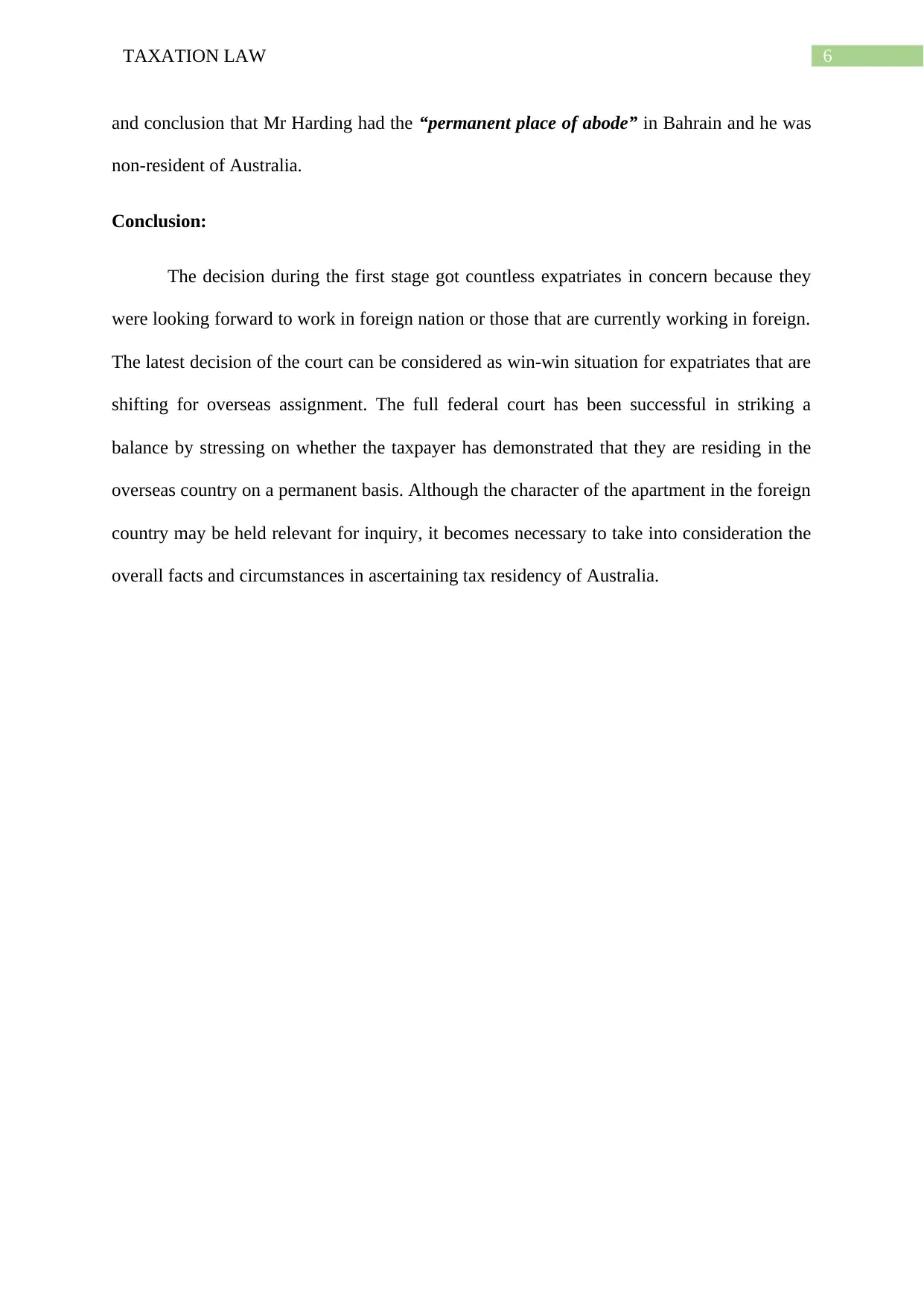
6TAXATION LAW
and conclusion that Mr Harding had the “permanent place of abode” in Bahrain and he was
non-resident of Australia.
Conclusion:
The decision during the first stage got countless expatriates in concern because they
were looking forward to work in foreign nation or those that are currently working in foreign.
The latest decision of the court can be considered as win-win situation for expatriates that are
shifting for overseas assignment. The full federal court has been successful in striking a
balance by stressing on whether the taxpayer has demonstrated that they are residing in the
overseas country on a permanent basis. Although the character of the apartment in the foreign
country may be held relevant for inquiry, it becomes necessary to take into consideration the
overall facts and circumstances in ascertaining tax residency of Australia.
and conclusion that Mr Harding had the “permanent place of abode” in Bahrain and he was
non-resident of Australia.
Conclusion:
The decision during the first stage got countless expatriates in concern because they
were looking forward to work in foreign nation or those that are currently working in foreign.
The latest decision of the court can be considered as win-win situation for expatriates that are
shifting for overseas assignment. The full federal court has been successful in striking a
balance by stressing on whether the taxpayer has demonstrated that they are residing in the
overseas country on a permanent basis. Although the character of the apartment in the foreign
country may be held relevant for inquiry, it becomes necessary to take into consideration the
overall facts and circumstances in ascertaining tax residency of Australia.
Paraphrase This Document
Need a fresh take? Get an instant paraphrase of this document with our AI Paraphraser
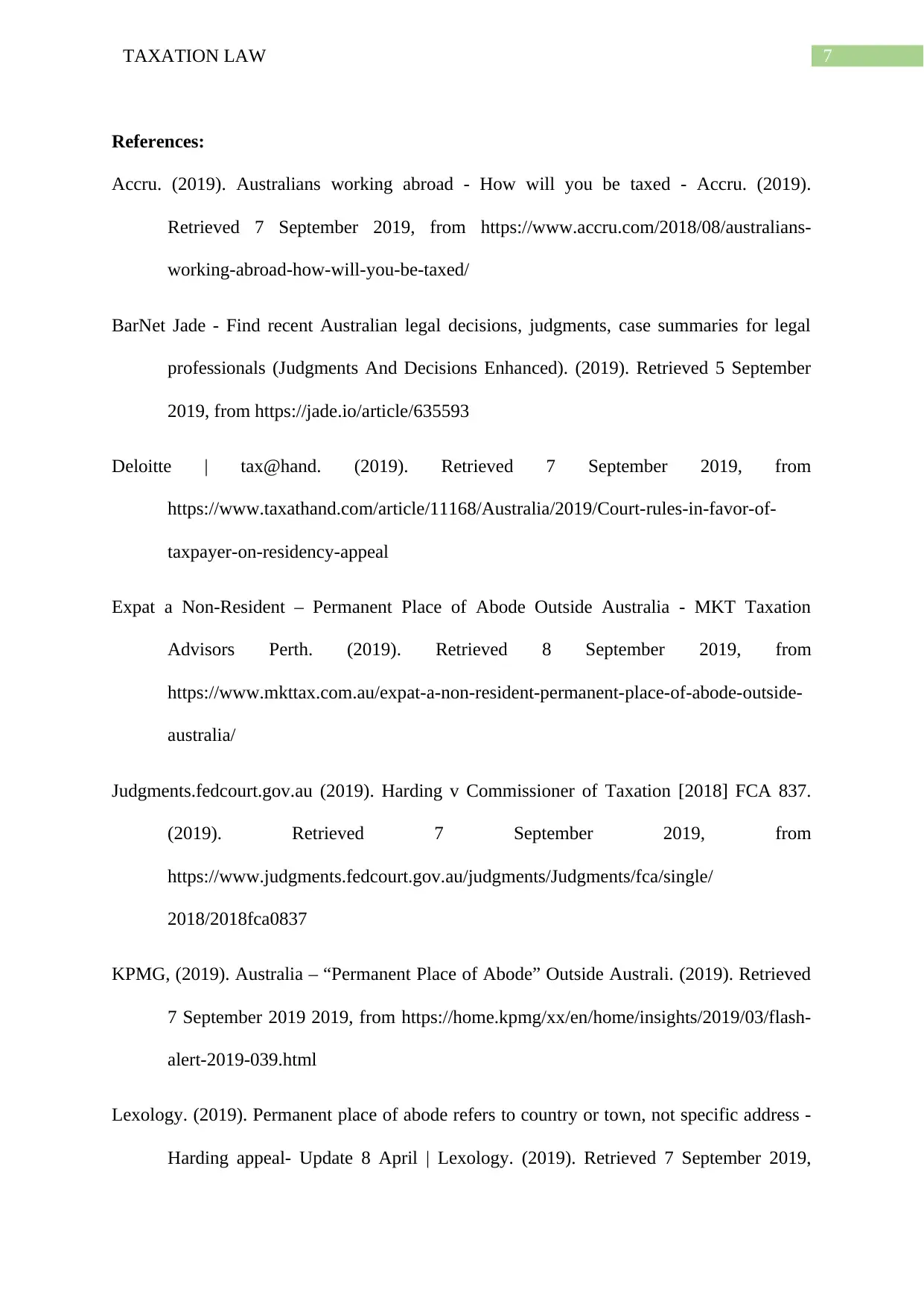
7TAXATION LAW
References:
Accru. (2019). Australians working abroad - How will you be taxed - Accru. (2019).
Retrieved 7 September 2019, from https://www.accru.com/2018/08/australians-
working-abroad-how-will-you-be-taxed/
BarNet Jade - Find recent Australian legal decisions, judgments, case summaries for legal
professionals (Judgments And Decisions Enhanced). (2019). Retrieved 5 September
2019, from https://jade.io/article/635593
Deloitte | tax@hand. (2019). Retrieved 7 September 2019, from
https://www.taxathand.com/article/11168/Australia/2019/Court-rules-in-favor-of-
taxpayer-on-residency-appeal
Expat a Non-Resident – Permanent Place of Abode Outside Australia - MKT Taxation
Advisors Perth. (2019). Retrieved 8 September 2019, from
https://www.mkttax.com.au/expat-a-non-resident-permanent-place-of-abode-outside-
australia/
Judgments.fedcourt.gov.au (2019). Harding v Commissioner of Taxation [2018] FCA 837.
(2019). Retrieved 7 September 2019, from
https://www.judgments.fedcourt.gov.au/judgments/Judgments/fca/single/
2018/2018fca0837
KPMG, (2019). Australia – “Permanent Place of Abode” Outside Australi. (2019). Retrieved
7 September 2019 2019, from https://home.kpmg/xx/en/home/insights/2019/03/flash-
alert-2019-039.html
Lexology. (2019). Permanent place of abode refers to country or town, not specific address -
Harding appeal- Update 8 April | Lexology. (2019). Retrieved 7 September 2019,
References:
Accru. (2019). Australians working abroad - How will you be taxed - Accru. (2019).
Retrieved 7 September 2019, from https://www.accru.com/2018/08/australians-
working-abroad-how-will-you-be-taxed/
BarNet Jade - Find recent Australian legal decisions, judgments, case summaries for legal
professionals (Judgments And Decisions Enhanced). (2019). Retrieved 5 September
2019, from https://jade.io/article/635593
Deloitte | tax@hand. (2019). Retrieved 7 September 2019, from
https://www.taxathand.com/article/11168/Australia/2019/Court-rules-in-favor-of-
taxpayer-on-residency-appeal
Expat a Non-Resident – Permanent Place of Abode Outside Australia - MKT Taxation
Advisors Perth. (2019). Retrieved 8 September 2019, from
https://www.mkttax.com.au/expat-a-non-resident-permanent-place-of-abode-outside-
australia/
Judgments.fedcourt.gov.au (2019). Harding v Commissioner of Taxation [2018] FCA 837.
(2019). Retrieved 7 September 2019, from
https://www.judgments.fedcourt.gov.au/judgments/Judgments/fca/single/
2018/2018fca0837
KPMG, (2019). Australia – “Permanent Place of Abode” Outside Australi. (2019). Retrieved
7 September 2019 2019, from https://home.kpmg/xx/en/home/insights/2019/03/flash-
alert-2019-039.html
Lexology. (2019). Permanent place of abode refers to country or town, not specific address -
Harding appeal- Update 8 April | Lexology. (2019). Retrieved 7 September 2019,
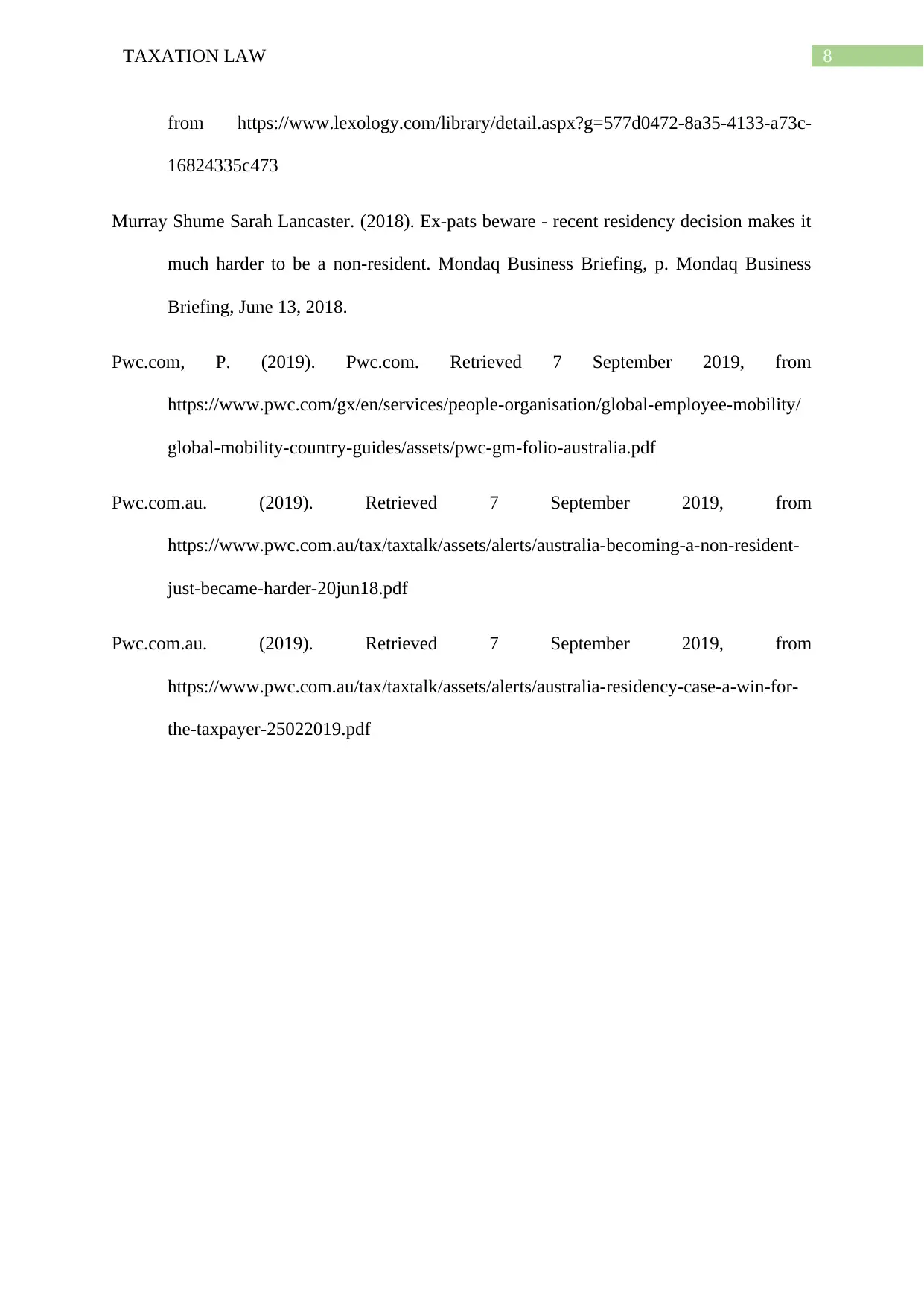
8TAXATION LAW
from https://www.lexology.com/library/detail.aspx?g=577d0472-8a35-4133-a73c-
16824335c473
Murray Shume Sarah Lancaster. (2018). Ex-pats beware - recent residency decision makes it
much harder to be a non-resident. Mondaq Business Briefing, p. Mondaq Business
Briefing, June 13, 2018.
Pwc.com, P. (2019). Pwc.com. Retrieved 7 September 2019, from
https://www.pwc.com/gx/en/services/people-organisation/global-employee-mobility/
global-mobility-country-guides/assets/pwc-gm-folio-australia.pdf
Pwc.com.au. (2019). Retrieved 7 September 2019, from
https://www.pwc.com.au/tax/taxtalk/assets/alerts/australia-becoming-a-non-resident-
just-became-harder-20jun18.pdf
Pwc.com.au. (2019). Retrieved 7 September 2019, from
https://www.pwc.com.au/tax/taxtalk/assets/alerts/australia-residency-case-a-win-for-
the-taxpayer-25022019.pdf
from https://www.lexology.com/library/detail.aspx?g=577d0472-8a35-4133-a73c-
16824335c473
Murray Shume Sarah Lancaster. (2018). Ex-pats beware - recent residency decision makes it
much harder to be a non-resident. Mondaq Business Briefing, p. Mondaq Business
Briefing, June 13, 2018.
Pwc.com, P. (2019). Pwc.com. Retrieved 7 September 2019, from
https://www.pwc.com/gx/en/services/people-organisation/global-employee-mobility/
global-mobility-country-guides/assets/pwc-gm-folio-australia.pdf
Pwc.com.au. (2019). Retrieved 7 September 2019, from
https://www.pwc.com.au/tax/taxtalk/assets/alerts/australia-becoming-a-non-resident-
just-became-harder-20jun18.pdf
Pwc.com.au. (2019). Retrieved 7 September 2019, from
https://www.pwc.com.au/tax/taxtalk/assets/alerts/australia-residency-case-a-win-for-
the-taxpayer-25022019.pdf
⊘ This is a preview!⊘
Do you want full access?
Subscribe today to unlock all pages.

Trusted by 1+ million students worldwide
1 out of 9
Related Documents
Your All-in-One AI-Powered Toolkit for Academic Success.
+13062052269
info@desklib.com
Available 24*7 on WhatsApp / Email
![[object Object]](/_next/static/media/star-bottom.7253800d.svg)
Unlock your academic potential
Copyright © 2020–2026 A2Z Services. All Rights Reserved. Developed and managed by ZUCOL.





